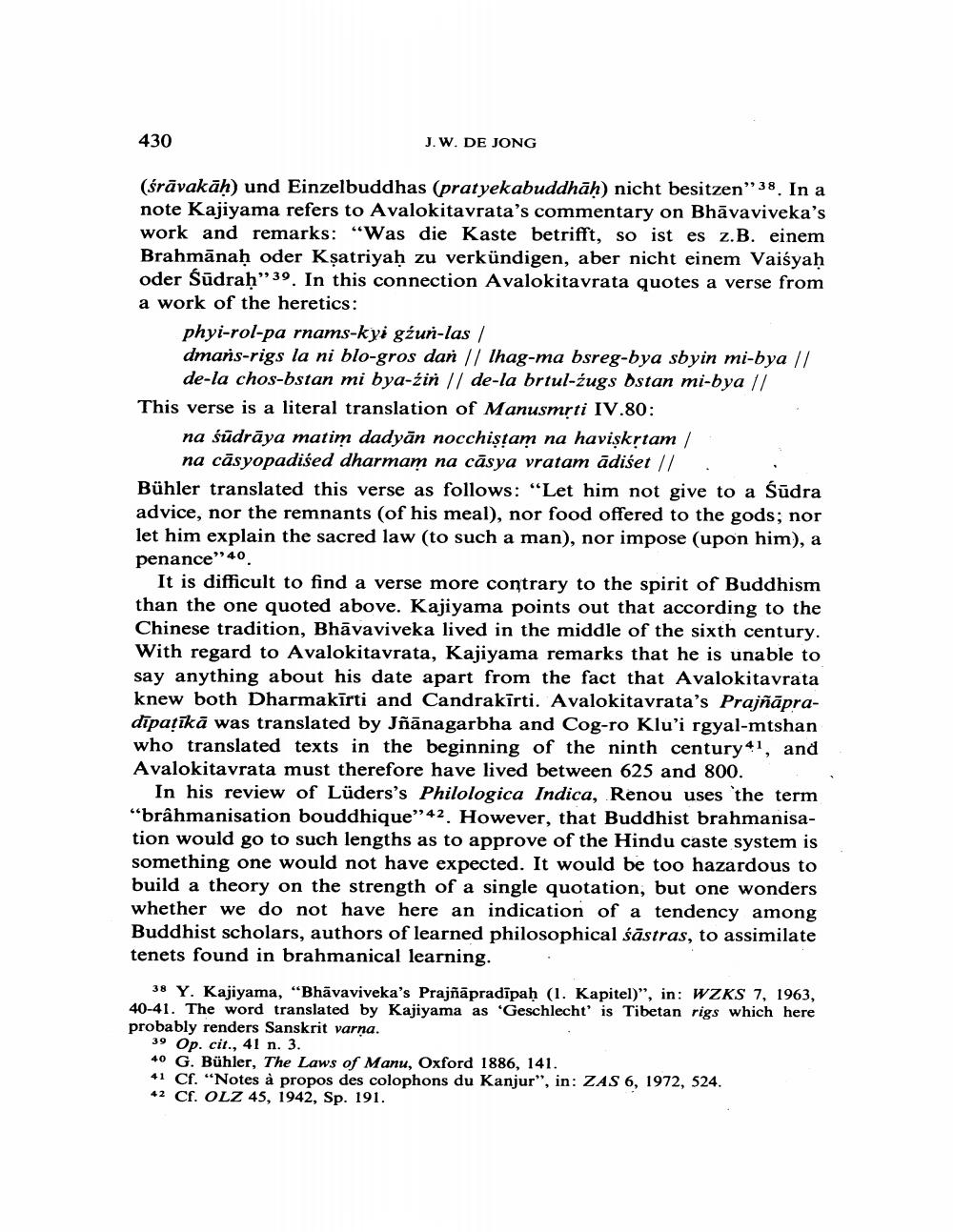Book Title: Buddhism And Equality Of Four Castes Author(s): J W De Jong Publisher: J W De Jong View full book textPage 8
________________ 430 J. W. DE JONG (śrāvakāh) und Einzelbuddhas (pratyekabuddhāh) nicht besitzen"38. In a note Kajiyama refers to Avalokitavrata's commentary on Bhāvaviveka's work and remarks: "Was die Kaste betrifft, so ist es z. B. einem Brahmānaḥ oder Ksatriyaḥ zu verkündigen, aber nicht einem Vaisyah oder Śūdrah"39. In this connection Avalokitavrata quotes a verse from a work of the heretics: phyi-rol-pa rnams-kyi gzun-las / dmars-rigs la ni blo-gros dan // Ihag-ma bsreg-bya sbyin mi-bya // de-la chos-bstan mi bya-zin || de-la brtul-zugs Ostan mi-bya // This verse is a literal translation of Manusmrti IV.80: na śūdrāya matim dadyān nocchistam na havişkrtam/ na cāsyopadiśed dharmam na cāsya vratam ādiśet // . Bühler translated this verse as follows: "Let him not give to a Śūdra advice, nor the remnants (of his meal), nor food offered to the gods; nor let him explain the sacred law (to such a man), nor impose (upon him), a penance" 40. It is difficult to find a verse more contrary to the spirit of Buddhism than the one quoted above. Kajiyama points out that according to the Chinese tradition, Bhāvaviveka lived in the middle of the sixth century. With regard to Avalokitavrata, Kajiyama remarks that he is unable to say anything about his date apart from the fact that Avalokitavrata knew both Dharmakīrti and Candrakīrti. Avalokitavrata's Prajñāpradīpațīkā was translated by Jñānagarbha and Cog-ro Klu'i rgyal-mtshan who translated texts in the beginning of the ninth century41, and Avalokitavrata must therefore have lived between 625 and 800. In his review of Lüders's Philologica Indica, Renou uses the term “brâhmanisation bouddhique"42. However, that Buddhist brahmanisation would go to such lengths as to approve of the Hindu caste system is something one would not have expected. It would be too hazardous to build a theory on the strength of a single quotation, but one wonders whether we do not have here an indication of a tendency among Buddhist scholars, authors of learned philosophical śāstras, to assimilate tenets found in brahmanical learning. 38 Y. Kajiyama, “Bhāvaviveka's Prajñāpradīpah (1. Kapitel)", in: WZKS 7, 1963, 40-41. The word translated by Kajiyama as 'Geschlecht' is Tibetan rigs which here probably renders Sanskrit varna. 39 Op. cit., 41 n. 3. 40 G. Bühler, The Laws of Manu, Oxford 1886, 141. 41 Cf. “Notes à propos des colophons du Kanjur", in: ZAS 6, 1972, 524. 42 Cf. OLZ 45, 1942, Sp. 191.Page Navigation
1 ... 6 7 8 9
